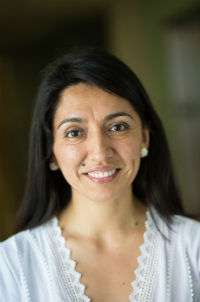
Q&A: Mónica Guerrero Vázquez
April 9, 2018
Born in Ecuador and raised in Spain after migrating with her parents in the 1990s, Bloomberg Fellow Mónica Guerrero Vázquez has always had a heart for immigrants. As program coordinator at Johns Hopkins Medicine’s Center for Health and Opportunities for Latinos, or Centro SOL, she has a bird’s eye view of many initiatives aimed at improving access to health care among Latinos in Baltimore and beyond. Now she’s focusing on risks to adolescent health as an MPH student at the Johns Hopkins Bloomberg School of Public Health.
We talked to Guerrero Vázquez about how she got into public health, why adolescent health is so foundational, and how she’s connecting her studies and her work at Centro SOL.
How did you find Centro SOL?
When I came to Baltimore I was shocked by the disparities I saw. While I was getting settled, I volunteered for a few Catholic charities that serve immigrant communities. I didn’t have health insurance, so on my search for a primary care doctor and insurance, I found out about Johns Hopkins Medicine’s programs for people without health insurance and I was able to get care. My doctor back then was doing a program working with Latinos. I thought, well I speak Spanish, I love working with immigrants, I’m an immigrant, I can relate to the struggles they have, can I work with you? Long story short, the program coordinator position opened up, I was invited to apply and, fortunately, was selected.
You’ve worked at Hopkins for four years. How did you come to apply for the MPH program?
My great supervisors and mentors motivated me to apply. Most of my work at Centro SOL was already about tackling public health issues in a vulnerable community. Empowering people drives me, and to me the cool thing about child and adolescent health is that they’re not isolated areas. For example, if you want to address education issues, you have to include the parents. If you want to do teen pregnancy programs, you have to include health care systems.
All those things together, I feel, are comprehensive approaches to solving a lot of problems in our society.
How are you connecting your studies to your work at Centro SOL?
Right now, my group practicum is aiming to develop a curriculum to support young undocumented immigrants. I’m also working on a project that raises awareness and gives information to people about suicide prevention in response to an uptick of suicide cases among youth and young adults.
I’m also working on exposing Latino youth to Hopkins through activities like an immigrant and refugee day that I’m organizing with some of my classmates. This is where adolescents from seven Baltimore City schools will be paired with grad students to get exposed to what a day in grad school is like. It’s kind of my way of bringing Centro SOL to the school because when you do these kinds of things, there is conversation about it and I think that’s the beginning of action.
Connect With Us
Receive all the latest news from the Initiative by signing up for the American Health Dispatch newsletter, subscribing to the American Health Podcast, and subscribing to our YouTube channel.
Contact Us